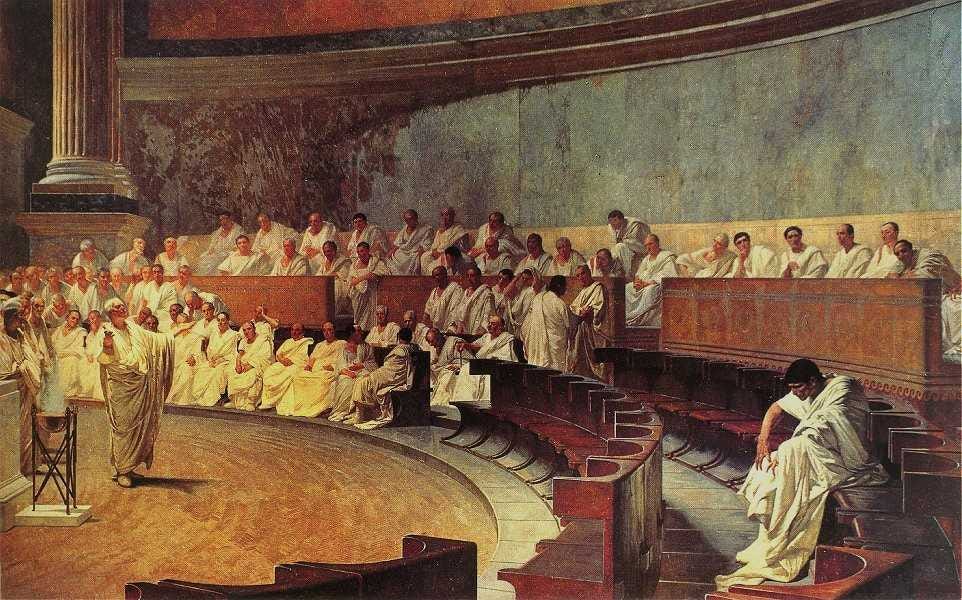In Part 4 we look at the way that words can tangle us, lure us and trip into doing things we did not intend. In a world where every device from tv and radio, to social media uses words in ways to manipulate us, the teachings in Steps 14-17 come as useful support to us. Let’s find out how to become proof against persuasion.
BECOMING PROOF AGAINST PERSUASION
The ancient world was one where people debated verbally and vigorously, discussing this and that thing. From the dialogues of Socrates right down to the marketplaces of the Byzantium empire where even cheesemongers and muleteers passionately disputed whether the Holy Spirit descended from the Father and/or the Son, we understand that the Greeks always liked a good disputation, and enjoyed discussing what was what, and whether something was good to do or not.
The sophist or professional orator with a trained voice and persuasive words was a character whom philosophers often inveighed against, as they could be professionally hired to speak for or against a topic without an ounce of conviction.
A sophist could behave like Saruman in Tolkien’s Lord of the Rings, full of the powers of suggestion, since someone with a rich, sonorous voice. employed with well-placed gestures and suggestive arguments. could present a whole raft of things, but he was anyone’s to employ, rather like the spin-doctors of politicians today, who bring things down to the memorable sound-bite, but who may not have any personal investment in the topic, besides coming out on top. The orator was also regarded as a person of opinion rather than reason: sometimes orators could be someone who had been trained in philosophy and could speak with wisdom also.
Epictetus asks, ‘What is the first task for someone intent on practising philosophy? The first task is to rid yourself of presumption, because it’s impossible for anyone to set out to learn what he thinks he already knows.’ (ED 2:17,1) If we haven’t submitted to scrutiny the ordinary words and concepts that we use daily, we may carry our own preconceptions about them, also, which is what this 4th part is all about.
The assumed knowledge that we think llttle of makes us prey to the oratory and persuasion of others, where what is beneficial for us might be confused with what is harmful: as when we submit to the lure of the advert that tells us we are lacking in some quality that the advertiser is zealous to provide us with. If I believe the advertising blurb that my thin, fine hair will be made lustrously abundant by the hair product, then I am being foolish. If I then start telling others this nonsense, I become a liar. A hair product only has the power to coat my fine hair with some substances which briefly make it appear thicker, and which will wash away very soon. Such a product will not grow my hair thicker, since its essential ageing nature renders it thin.
The task in this part is to is to really listen and understand, coming into a better relationship with the words we ourselves utter.
Here we come to the nub of philosophy’s meaning, that we need to apply ourselves practically and test out the theory of what we are being told: the temptation is to cleave to the words alone, rather than apply their meaning. Words can become the veil that hides our own inability to apply philosophical principles, as Epictetus demonstrates:
‘Have you applied yourself to philosophy in name only, and as far as you can disgraced its principles, by showing that they are without benefit and useless to those who profess them. Have you never desired constancy, tranquillity, and serenity as the object of your desires; have you sought out no teacher for this knowledge, but been rather to many teachers for mere syllogisms? Have you never, of your own volition, confronted some delusive impression with, "Can I bear this, or can I not bear it? What remains for me to do?" as if all your affairs were secure and well, and you have aimed only to secure yourself in your present possessions. What are these? Cowardice, mean-spiritedness, worldliness, unaccomplished desires, unavailing aversions. These are the things which you have been labouring to secure. Shouldn’t you first acquire something by the use of reason, and then ensured that it was secure?
Whoever saw a series of battlements without first building a wall to place them upon? And what kind of janitor can guard a door, when there isn’t one for him to watch over? Can you show me what you study? “Not to be shaken by the arguments of sophistry." Shaken from what? Show me first what you have in your custody; what do you measure, or what do you weigh; and then accordingly show me your weights and measures, and to what purpose do you measure what is basically dust and ashes. Should you not be measuring what makes us truly happy, what makes our affairs proceed as we wish; how we may blame no one, or find fault with anyone; how we can submit to the governing order of the universe?’ (ED 3: 26, 13-18)
The syllogisms mentioned in this passage by Epictetus were the deductive reasonings that were often on the lips of philosophers to put over a point. Aristotle defines a syllogism as ‘an argument (λόγος, logos) in which, certain things being posited, something other than what was laid down results by necessity because these things are so.’ (Aristotle, Prior Analytics 1, 24b19-20) Syllogisms come in many varieties and I am not going to baffle you with them here, but we have all come across some very silly ones, like this erroneous use of them:
‘Aristotle was a philosopher,
My cat is called Aristotle,
ergo, My cat is a philosopher!’


Which is rank nonsense, since my cat’s likeness to Aristotle begins and ends in their both sharing a name.
This one is at least logical and with which we would all concur, unless of course, you hold to the view that humans are of alien origin!
‘All humans are mammals.
All mammals are animals.
Therefore, all humans are animals.’
Yes, we can all get bogged down and tangled in words, but at least let us keep our judgement firm, our reason clear, and keep our ears open and attached to our understanding!
13th Step. IN THE WELTER OF WORDS
§ Many words, both base and noble, fall upon our ears;
Do not allow them to confuse you nor to block your way. §
- Verses 21-22
AT SPEAKER’S CORNER
Speaker’s Corner in Hyde Park, London is a place where anyone can go and stand on a box or ladder, and harangue the passers-by, trying to persuade them to come over to their opinion. It is a testament to free speech in Britain that, while there is usually a policeman on duty here to ensure that no-one gets violent or does anyone else a damage - since words can inflame and lead to other actions - these soap-box pundits are allowed to say what they like. If you visit, you will certainly be entertained, astounded or horrified by a wide set of persuasions, as some of the views declaimed here can be very extreme, cranky, or downright desperate. Any and all views can co-exist together here. While you may think that most people regard these soap-box orators as just cranks who have an axe to grind, yet others will visit in order to hear views expressed that sound very much like what is in their own hearts and minds. And while you can try to engage with some speakers, others will just shout you down. Those with the loudest voices, or those with a megaphone to amplify them, are not necessarily the ones you should heed.
Anciently, the art of oratory was practised by what were known as Sophists – those who could persuade you to their way of thinking by subtle reasoning. Sophocles had a wonderful time with them, leading them on with faux-naïve questions that took them over into a crevasse of poor reasoning into the oubliette of forgetfulness. The art of dialectic, or taking up points that led to logical and well-reasoned ends was part of the Platonic Academy, a school which continued the traditions of Sophocles and Plato.
Aristotle laid out the three modes by which persuasion by which we are moved by oratory: ‘Of the modes of persuasion furnished by the spoken word there are three kinds. The first kind depends on the personal character of the speaker (ethos); the second on putting the audience into a certain frame of mind (pathos); the third on the proof, or apparent proof provided by the words of the speech itself (logos). Persuasion is achieved by the speaker’s personal character when the speech is so spoken as to make us think him credible. (Aristotle, Rhetoric)
We understand immediately how these three modes of persuasion are set to catch us by our desire, emotions and our combative reactivity, as well as our reason, so we have to be very careful and on our guard, because we can be caught by the very righteous argument that speaks to our reason, as well as to our lower propensities.
A little prettification of the facts, or the lure the words that sway us, can become false friends, sign-posts leading to a country where, as Epictetus puts it, ‘we behave like a traveller who, on returning to his homeland passes through a place where there is very fine and, because he finds it pleasing, to remains there. But man! you’re forgotten your purpose: you weren’t travelling to this place, you were just passing through it. “But it’s a great inn!” Yes, and how many other inns are there, just as lovely, and how many meadows as well?! But only as places upon the way. The purpose behind your journey is to return home, to relieve the anxiety of your family; to fulfil your duties as a citizen; to marry; to have children; to hold public office. You didn’t come into the world to pick the most scenic places, but to return and live in the place where you were born, where you’ve been enrolled as a citizen!’ (ED 2:23, 36-39)
In this most scenic description of how we become way-laid by words and appearances, Epictetus is sounding just like Trip Advisor, I know, but he speaks the truth - we have all been led up the garden path, from the phone scammer to the advertising jingle, and to the more dangerous politician or celebrity who plays upon our prejudices and unspoken bias, causing us to enter perilous terrain where we forsake our heart-felt aims, and determined ethics, only to fall prey to something trivial that gives only passing satisfaction or a sense of having won something profound.
BEING POROUS TO DISTURBING NEWS
In our world, the daily international news channels bring us reports from all parts of the globe, news of natural disasters, violent murders, abductions and assaults, the mistreatment of the vulnerable, and the wars that rage onwards without a mention of peace or negotiation. In Britain, some morning news channels have taken to reporting only the bare headlines now, because they are aware that many people cannot hear so many dire reports at one time: these local morning channels are instead focussing upon national stories about achievements against the odds, or community campaigns that have successfully brought help to a disadvantaged group or individual, or how the advances of medical knowledge are helping people with difficult health conditions – while they are not always ‘good news’ stories, they are clearly aiming to alleviate the attention paid to the big disturbing stories
It is easy to become sucked into the big stories and to endlessly listen to debates about the hard things we or others have to face at this hour. These opinions and arguments tumble over each other endless as broadcasters struggle to fill the many hours that make up 24 hour, non-stop reporting. Epictetus comes to our rescue:
‘Whenever you hear accounts of disturbing news, have this thought ready to hand: news never relates to anything that lies outside your ambit of choice. No-one can bring you word that you’ve been harbouring a mistaken assumption or a wrong desire, for example. That can never be. But you can hear reports that someone’s died, or has been maligning you? So, what is that to you?... If you hear that your father has a certain plan he needs to fufill – is it against your will? Or is it against your body or your estate? You are safe then, because it it not against you. But say a judge charges you with impiety? Why should you trouble yourself? Maybe it is incumbent upon your father to perform something which, if he failed to do it, would cause him to lose the character of a father, of his natural affection or tenderness. Do not require him to lose anything else by this; for every man suffers precisely where he errs. Your duty, on the other hand, is to meet this plan, defending yourself with firmness, modesty, and mildness; otherwise, you forfeit piety, modesty, and nobleness and lose the character of a son. What have you to do with another’s evil?’ (ED 3.18.1-5)
You will say, ‘but we cannot help but feel it, when we are faced by difficult news!’ Our ability to be porous is a human skill, allowing us to come into accord with a view or a way of life that is held by our group. It also enables us to fall in with people who are travelling our way, so that we come into common cause and look out for each other in a temporary situation. It happens on holidays very commonly where you stay at the same hotel or in the same group of holiday makers: you make common cause for mutual benefit: these alliances do not last and, meeting up with such people in another situation back home can feel awkward, because the immediate conditions in which we bonded are now different.
Porosity also enables to feel empathy or sympathy with those who are undergoing sufferings and misfortunes. We are human and we understand how it feels to be lonely, bereft or hungry; or at least imagine keenly what it is to go into exile without your family, or to be unjustly imprisoned, as we watch the news. Of course, many people in our times have such pronounced porosity that they are virtually disabled from doing many things: they have to shield themselves from spectacles of distress, or news items on disasters; they cannot even hear about sufferings or assaults, because it triggers them. But we cannot live with our heads under a stone.
How do we proof ourselves against persuasion? Whether it be the pervasive propaganda of our own or another country, or the pushy politics being peddled like drugs to dull the public reason; whether you are sensitive to the opinions of friends on social media, or have fallen prey to the lying images of Artificial Intelligence, you have your own daimon and your own soul as a guide to truth. Hierocles counsels us:
‘Human choice, does not stand fast continually in either virtue or vice, but becomes articulated into arguments that have an ambivalent character... Some arguments are true, some good, some evil, and some false. This difference requires us to make a knowledgeable distinction so that we may pick up the better arguments. reject the worst ones. and not become sick with the total hatred of speaking because we condemn inferior arguments. nor become uncritically accepting of all of them. because we approve the better ones.... It is in human nature to be a bearer of all sorts of twisted opinions whenever that nature does not correctly follow common understandings. And so, as our text says, there is nothing surprising when a person who has not learned or discovered anything of the truth for themselves, comes into a state of conjecture and holds opinions contrary to the truth…. Confidence in knowledge also contributes greatly to gentleness.’ (GV XII, 1, 8)
We will turn once more to this gentleness in our next step, but now, we have to distinguish between the opinions based upon our own judgement. Are the words, reports or opinions rational, based upon truth, or are they ‘the utterances of a soul that has become unreasonable and confused by its passions?’ (GV XII, 5)
§ Consider §
· What are the kinds of opinions or persuasions that tend to confuse or upset you?
· What are the words that bring you into a dead-end, or which continue to echo?
· How do you judge what is true or faulty when you listen?
· Take one opinion or argument that you have heard or read today and let it be interviewed by the Cardinal Virtues: Judgement, Temperance, Courage, and Wisdom: is it sound? is it exaggerated? is it virtuous? Is it true? What else is going on in this argument? Pick it apart as much as you like. Does it hold together? Is it unjust? Is it carried away with itself? Is it running away from or avoiding something vital? Is it providing support or guidance to any kind of being?
MEDITATION
Sometimes it is the words that have been spoken against ourselves that block our way, because these tend to replay themselves. Whether it be your parent or teacher, or a friend or enemy, or a misunderstanding that seems to echo into eternity that makes you want to scrape both your ears and your memory to excise it. The very compulsion of words do not need to become engraved upon us, as Marcus Aurelius tells us, for they can become the very matter for us to work with, within the guidance of these Golden Verses:
‘It is in your power to live free from all compulsion in the greatest tranquillity of mind, even if all the world cry out against you as much as they choose, and even if wild beasts tear in pieces the members of this kneaded matter (flesh) which has grown around you. For what hinders the mind in the midst of all this from maintaining itself in tranquillity and in a just judgment of all surrounding things and in a ready use of the objects which are presented to it, so that the judgment may say to the thing which falls under its observation; “This you are in substance [reality], though in human opinion you may appear to be of a different kind;” and whatever it is that falls under your hand hall say to it: “You are the very thing that I was seeking; for to me, that which presents itself, is always a material for virtue, both rational and political, and in a word, for the ready exercise of skill which belongs to human beings or gods. For everything which happens has a relationship either to the divine or human, and is neither new nor difficult to handle, but is usual and apt matter to work on. (Marcus Aurelius, Meditations, 7, 68)










This step was particularly relevant because in this day and age we are constantly being bombarded by those who want us to buy certain products or take up certain beliefs. Also, you mentioned that some news programs are making an effort to include reports of positive events. I think we need more of that because it can get pretty depressing constantly hearing about all the suffering in the world and feeling powerless to remedy it.